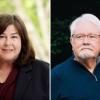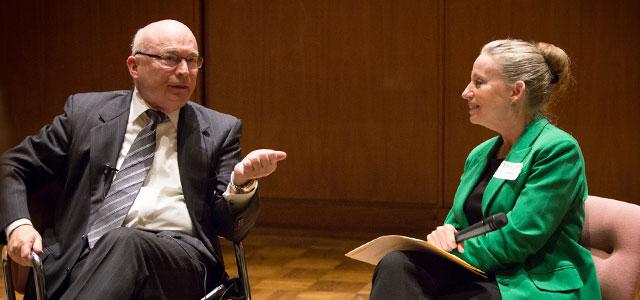
Jack Rowe and Mary Louise Fleming (photos by Elisabeth Fall)
The Future of Geriatric Nursing: A Conversation with Jack Rowe
John (Jack) W. Rowe, MD, is a professor in the Department of Health Policy and Management at the Columbia University Mailman School of Public Health. From 2000 to 2006, Rowe served as chairman and CEO of Aetna, one of the nation’s leading health care and related benefits organizations. From 1998 to 2000, he served as president and CEO of Mount Sinai New York University Health, one of the nation’s largest academic health care organizations. Rowe was director of the MacArthur Foundation Research Network on Successful Aging and currently leads the MacArthur Foundation’s Research Network on an Aging Society. He is an elected member of the Institute of Medicine of the National Academy of Sciences, a Fellow of the American Academy of Arts and Sciences and a trustee of the Rockefeller Foundation and Lincoln Center Theater. He is also an honorary fellow of the American Academy of Nursing.
At the recent “Innovations in Geriatric Nursing Care” conference at UC San Francisco School of Nursing, Rowe sat down with UCSF’s Mary Louise Fleming, RN, PhD, assistant clinical professor and director of the Nursing and Health Systems Leadership specialty, to discuss the future of geriatric nursing. What follows is an edited transcript of that conversation.
MLF: Good evening, everyone. We’re hoping, Dr. Rowe, that we can do three things tonight: get to know you a little bit more; pick your brain about the future of health care, and particularly health care for older adults; and give you the chance to challenge us, to help us think differently about what our contributions can be to health care and the population that we are really intent on serving.
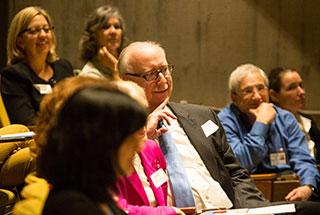 Dean David Vlahov (center) in the audience JR: I appreciate being here, so thank you very much for including me, [Dean David Vlahov]. I’ve worked with David for decades, very productively, and I look forward to having a conversation with you.
Dean David Vlahov (center) in the audience JR: I appreciate being here, so thank you very much for including me, [Dean David Vlahov]. I’ve worked with David for decades, very productively, and I look forward to having a conversation with you.
MLF: I wonder if you might take us back and let us know how your vision for health care change was formed and how you fed that across your career to really stay passionate and make a difference.
JR: I don’t feel I had that much of a vision. After my training in internal medicine, I knew I wanted an academic career focused on research. Through my career I think three ideas have guided me.
The first is to pick areas that are ripe for development or reform. I was interested in trying to identify an area of science that looked like it was starting to evolve, to skate to where the puck was going to be.… After interviewing for a position in several labs at the NIH, I decided…that I would do gerontology.… At the time, there were very few people doing this. When I told my colleagues that I was interested in doing aging work at Harvard, the chairman of medicine…said, “You’re ruining your career.”
It seemed to me, though, that the science of aging was important, to understand the diseases that old people developed, their response to treatment and the complications that ensue. I knew that to be successful in building a meaningful program in geriatrics at Harvard that it had to have a research core, and my two years of gerontology training at NIH provided an excellent background. I must say also that I was extraordinarily fortunate that I got there right at the right time.… There was actually quite a lot of positive reinforcement early on.
The second idea is leverage. Ten years after we began the program in aging at Harvard, I was asked, “How would you like to run Mount Sinai?” While I didn’t have much, if any, management experience, I was attracted to the leverage inherent in the role. As leader of both a major academic medical center and a school of medicine, I might influence a whole cadre of providers, patients and scientists.
The third idea is being opportunistic. Opportunism is not a four-letter word. You have to be willing to take some risks. And if when you get up in the morning and look at the mirror, you see a flashing amber light, you’re not ever likely to take the jump.
MLF: You said something about people warning you that a focus on aging would ruin your career. Sometimes we still hear that same advice, and I’m wondering what we need to do to shift that?
JR: I learned a lot about the critical importance of personal respect. The chairman of medicine [at Harvard at the time] was a famous and wonderful guy, Eugene Braunwald, who was very supportive of my efforts in every way. One day he said something that I interpreted as derogatory about geriatrics. I said, “Gene, I’m a little concerned about your opinion of geriatrics.” And he said to me – and this was a really interesting clue for me – he said, “I don’t think much of geriatrics, but I think you are terrific.” So some of these people just bet on the person and not the field. I thought that was very instructive.
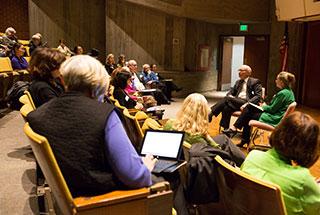 MLF: That’s an important point.… I wonder if we could shift this to nursing a bit. Can I get you to tell the story you told me earlier about your daughter?
MLF: That’s an important point.… I wonder if we could shift this to nursing a bit. Can I get you to tell the story you told me earlier about your daughter?
JR: Sure. Over time, I’d become increasingly interested in nursing. When you run what is arguably the largest academic medical center in the country, you have a lot of nursing staff. And when you’re a geriatrician, you recognize – at least in my case – that it is the nurses who take care of patients. So already I had a lot of respect for nursing.
Then, while a student at Harvard, my daughter had a medical problem, which was handled effectively at the University Health Service. When we were together again, I asked, “How did you like the Health Service?” She said, “It’s really great. They’re first-class.… The people were really good. In fact, did I ever tell you that my doctor is a nurse?” I think that changed it for me. Because this is a highly intelligent young woman – take my word for it: she knows the difference between a nurse and a physician. But for her, there’s no difference. And for me that was a very interesting data point.
Nursing’s Role
MLF: I love that story because today there are many conversations about supervision, independent practice, being able to bill and be involved in the health care system differently. And yet we know nationally, there are so many models. And I thought it might be good for us – a shot in the arm – to hear about different models that are there for nursing…and how we might help change the conversation.
JR: I think for this conversation, it’s worth going back to the idea of being opportunistic. I’m not here to be critical of the nursing profession – I like to see myself as part of the solution – but I am critical of some aspects of it. One thing that needs to be done to make more progress is that you need to get together. Nurses are always arguing with each other. If I hear another argument about the PhD versus the DNP, I’m going to get sick. Just get over it. There may be 3 million of you, but you don’t have the power, and you’re never going to get anywhere unless you get on the same page.
The other thing is you like to go up against insurmountable odds. I’ll give you an obvious example: The discussions about nursing in the United States – part of which are derived from the Institute of Medicine-Robert Wood Johnson [Foundation] report [The Future of Nursing: Leading Change, Advancing Health] – deal with nursing education and general competence, as well as advancing more baccalaureates and doctoral-prepared nurses, the scope of practice and new models of care. Nurses are trying to advance those ideas across a wide battlefield, and there’s a tremendous amount of resistance from organized medicine, particularly in certain strongholds like family practice, where there are a lot of physicians.
But in geriatrics, as you probably all well know, there are very few physicians. The few that are still standing are rapidly dribbling off the court. There are fewer certified geriatricians every year than the year before.… Yet from the point of view of demand, it’s the most rapidly growing part of medicine in the United States. The most rapidly growing portion of private insurance in the United States is Medicare Advantage. Geriatric patients and the revenue associated with them are going to control medicine in the United States. So I can’t understand why you haven’t gerontologized nursing. If you created a cadre of advanced practice nurses with an interest in geriatrics…
I know that 2.6 percent of advanced practice nurses specialize in geriatrics, but that seems like a low number to me, since the 13 percent of the population that’s elderly accounts for 26 percent of the health care, and 2.6 percent of the nurses sounds like about a 10th of what you would need, and maybe a 20th of what you can have. You could take over geriatrics in the United States, and there wouldn’t be very many people pushing back, particularly if you want to do geriatric psychiatry. There’s one geriatric psychiatrist for every 20,000 old people, whether they need it or not.
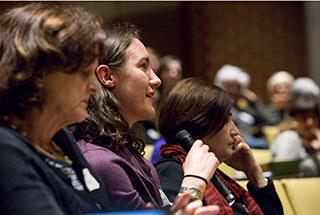 The following questions were from the audience.
The following questions were from the audience.
Q [CNS]: There’s been a shift, at least at UCSF, to the adult away from just the geriatric program, and I’m wondering, given what you’ve said, why this would occur at this time when there is such a need for advanced practice nurses in geriatrics. It’s like a step back to my mind.
JR: UCSF School of Nursing has a strong and highly respected program in geriatrics. I know [UCSF physicians] Louise Walter and Christine Ritchie. Their colleagues respect them, and they are respected by the dean and acting chancellor – I think it’s worth understanding that putting geriatrics and adult medicine together has a couple of origins. One has to do with the science that the members of the faculty do. Some scientists want to study the entire life cycle and don’t want to be in the department of geriatrics.
When I was the president of Mount Sinai, there was a department of geriatrics, and there was a very notable leader, Bob Butler, who some of you may have known, a giant in the field, unquestionably the most recognized geriatrician in the United States. He named his program the “Department of Geriatrics and Adult Development.” So it’s not news, and I don’t think it represents a step back in any way. I think it’s consistent with the science piece.
Seizing the Moment
Q [second-year nursing student]: You said there’s a big opportunity for nurses in gerontology, but we’ve also heard of a lot of programs that are stepping away from gerontology. What’s your advice for encouraging either new students or current nurses to explore this field?
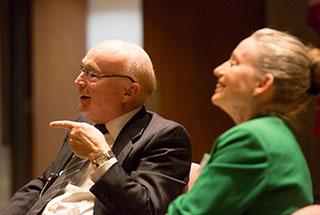 JR: First, I’m not challenging you to change the field of nursing. When I was talking about how nursing should be opportunistic and put the pedal to the metal in gerontologic nursing, I was talking to Dean Vlahov. But supply responds to demand. And I think that if students started to show more interest, particularly really able students, then those programs that are competing with other programs to get the most [talented] students are going to develop new programs in response to that.
JR: First, I’m not challenging you to change the field of nursing. When I was talking about how nursing should be opportunistic and put the pedal to the metal in gerontologic nursing, I was talking to Dean Vlahov. But supply responds to demand. And I think that if students started to show more interest, particularly really able students, then those programs that are competing with other programs to get the most [talented] students are going to develop new programs in response to that.
But I also think that the decisions have to be made at the top, because these are allocation decisions. Some nursing schools are going to look at the demographics, maybe find a donor or two and say, “Okay, we’re going to establish more programs or enhance the capacity of our programs.”
The other thing is that, while there are few gerontologically oriented nurse practitioners, there are even fewer gerontologically oriented nurse researchers. So one of the advantages you have here, obviously, is that this is a research-intensive school of nursing – you lead the country in NIH grants – and you do have a research program in gerontological nursing in the context of the Hartford program. That would seem to me to be a platform that you could develop fairly widely. I know Sue Chapman and her colleagues also have support for research on health care workforce issues, and many of those have to do with long-term care, home care, aging and related issues.
Q [CNS]: I’m a recent graduate from the master’s program, and I work as a CNS at the VA and as a bedside nurse at Kaiser. My experience has been that there’s a real difference in perspective from acute care nurses versus people in the community versus long-term care nurses. We’re all experiencing a different part of the problem, but we’re not talking or looking at the policy issues or the bigger picture together – and looking at how we can be part of the solution. I wonder what your thoughts are around how to facilitate that kind of getting together.
JR: I don’t really know enough about the structure and function of nursing in America to give you advice about how to organize things. I would suggest that, if geriatric nursing wants to advance, it should do it with geriatric physicians, rather than separately. Geriatric physicians really are the only ones that are going to help you. They’re not going to be threatened by you in the main, the leadership particularly.
Let me give you an example: There was a nurse who I worked with when I was at Harvard, Terry Fulmer, and we started the program in geriatrics, and she went on to be a dean and has overseen nursing at several other schools. Terry Fulmer got elected to be the head of the clinical medicine division of the Gerontological Society of America. Then she got elected to be the president of the Gerontological Society. The clinical medicine section is 90 or 95 percent physicians. If they elected a nurse to be the head, they’re sympathetic. And the physicians that you have to convince to give you the opportunity are going to listen to a combined voice of nurses and physicians, more than just nurses. There are two possible targets: there’s the American Geriatrics Society; the other is the Gerontological Society of America. And I would make it a part of the strategy to do it with physicians. I think that’s been absent so far.
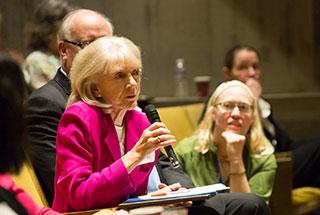 Jeanie Schmit Kayser-Jones asks a question. Q [Jeanie Schmit Kayser-Jones, professor emerita]: I wonder why there is a decline in geriatricians. When I started in my research career, there seemed to be an enormous amount of excitement and enthusiasm. Dr. Butler, of course, and Dr. Frank Williams and yourself. Why is there a decline?
Jeanie Schmit Kayser-Jones asks a question. Q [Jeanie Schmit Kayser-Jones, professor emerita]: I wonder why there is a decline in geriatricians. When I started in my research career, there seemed to be an enormous amount of excitement and enthusiasm. Dr. Butler, of course, and Dr. Frank Williams and yourself. Why is there a decline?
JR: Most doctors aren’t that impressed by me – or Bob Butler or Frank Williams. But the real reason, apart from the cultural part of American medicine that doesn’t really value older people very much, is that if you’re a board-certified internist, and you do a fellowship in geriatrics for two years, your income goes down $45,000 because you’ve changed your population of patients from a mixture of commercially insured and Medicare to all Medicare. If you’re a geriatrician, and you spend an hour doing an evaluation and treating a patient, you get paid exactly the same as somebody who never took any geriatrics and is just an internist – not that being just an internist is bad. I think that’s one of the reasons.
What we geriatricians decided is, since there aren’t enough of us…let’s see if we can increase the competence of internists in geriatrics, since they’re the ones who are going to be taking care of patients anyway. So we strive to increase the geriatric competence of everyone. I think that’s the way that medicine has to go because it’s not about the doctors or the nurses; it’s about the patients.
Q [PhD student]: I’m trying to define how to integrate palliative care and primary care. How can we best work together if there’s a lot of information out there that advanced practice nurses are the same as doctors, but it’s really a team effort? What’s your best recommendation for this opportunity to fill that workforce challenge in primary care?
JR: We’re 45,000 short in terms of primary care physicians and probably will be 60,000 short after we insure another 30 million people. From my point of view, all you’re going to have to do is hang out on the street corner.… What’s going to happen is what happened in Massachusetts. When Massachusetts led the nation in universal coverage, the headline was that nobody could find a doctor. And then the nurses came along and said, “By the way, in terms of routine primary care, we’re here.”
The other thing that’s important is when nurse leaders say that nurses are “the same as doctors.” Don’t say that. This is part of the “I’m going to take on the insurmountable and insult the people I need as allies” approach.
Here’s the argument from some parts of organized medicine – you’ve heard it a thousand times; let’s take me [as an example]: I went to medical school for four years, I did a couple of years of residency, I trained in NIH for two years, I did a two-year fellowship. Then I was chief resident in medicine for a year. I must know more than a nurse. And every state and federal policymaker buys that argument.
But the argument is not that doctors and nurses are the same. While physicians have more training and may know more medicine than nurses, the evidence is clear that they do not provide higher-quality, more effective core primary care services than credentialed advanced practice nurses. Don’t let them convert the argument to “nurses are equal to doctors.” The big trap is there, and you have to be very assiduous about not falling into it.
MLF: What about the research that’s talked about equal outcomes or equal-or-better outcomes between nurses and MDs? How do we think about that language and pulling that into the discussion differently?
JR: This has to do with the very interesting issue of “Our results are as good; therefore, we should get paid the same.” Again, this is part of the “Let’s scale the insurmountable. Let’s make it as hard as we possibly can to make any progress.” This is not a path to success. Would equal payment happen someday? Maybe. Is this the time to start? No. What’s missing, from my point of view – and I don’t want to be derogatory in any way – is the coherent, professional, organized strategy.
How Health Care Reform Impacts Gerontological Nursing
Q [MSN, MBA]: With health care reform, I’m really interested in hearing from an insurance person. What do you guys look at when you make your financial health care decisions, because that’s going to determine what gets reimbursed? What we know ahead of time under health care reform is very confusing.
JR: The opportunity for nurses is that we are no longer going to be paying individual providers and individual hospitals. We are going to be paying accountable care organizations for the care of a population of people. There are 35 accountable care organizations (ACOs) in Medicare, and there are over 200 in the United States, which represent deals between insurance companies and groups of providers. This is taking over the health insurance industry. What’s going to happen is, you’re going to get paid based on the number of people you take care of and the quality of the care.
Since we know that nurses give the same quality of basic primary care as physicians, and since we don’t care, as the insurance company, whether you have doctors or nurses – we just care about the care provided and the quality – we’re going to send a check to the UCSF ACO. And the person at the UCSF ACO is then going to allocate the money. So nurses don’t have to try to push the physicians off the stage in front of the insurers; nurses just have to be part of the team, do a good job and provide good care. They’ll get a little less salary than the physicians, and because of that they’ll get a bigger piece of the pie. I think that the ACOs represent a tremendous opportunity for nurses, and the Medicare ACOs are a tremendous opportunity for gerontological nurses. You need to make sure that the chancellor of UCSF and the head of the UCSF hospital understand this.


